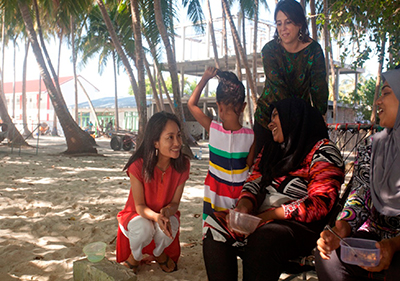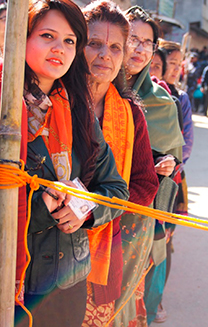Stories from the Field 8
Voices of Japanese Personnel Working in International Organizations
– Message from the Maldives to Everyone Interested in International Cooperation

Representative Shoko Noda enjoying a friendly chat with women in a community in the Maldives (Photo: Munshid Mohamed/UNDP Maldives)
22 years have passed since I responded to a question during my JPO* interview about my future career, saying “I want to become a United Nations Resident Coordinator of a country.” Currently, I am in my 5th year of my appointment as the UN Resident Coordinator and Country Representative of the United Nations Development Programme (UNDP) in the Maldives. A UN Resident Coordinator is a general coordinator of UN Agencies that are active inside and outside the country of appointment. The scope of the work is widely varied, and involves directing the five-year development plan of the entire UN, advocacy activities relating to human rights, and preventive diplomacy based on analysis of the political situation. To date, I have worked in nine countries, and the pleasure of working as a UN Resident Coordinator here in the Maldives is beyond compare.
I became interested in a career in development when I went on a diving trip to the Philippines during my fourth year in university. In contrast with what should have been an enjoyable holiday, I witnessed the heartbreaking plight of the street children. This experience raised my awareness of the issues related to inequality, and made me think of what I can do to improve the international community. In my JPO interview, although I spoke of my big dream, I never thought that I would really become a UN representative. In addition to effort, willpower, and physical strength, I feel that I was able to open up my future path by picturing my life goals clearly.
Later, after getting a master’s degree and working at a think tank in Tokyo for a little less than two years, I was dispatched in 1998 as a JPO to post-conflict Tajikistan. Afterwards, I was assigned to the offices in Kosovo, former Yugoslavia, and Administrator’s office of the UNDP headquarters in New York, followed by appointments to the Congo suffering from continued disorder, Pakistan after a big earthquake, Mongolia where mine development was gaining attention, and post-civil-war Nepal. I was able to be present on the frontline during important transitional phases in the development of each country, and gained valuable experiences.

Women waiting to vote in a long line for the Constituent Assembly elections in Nepal in 2013 (Photo: Representative Shoko Noda)
Each and every one of these countries faces individual developmental challenges, and the strategies and solutions that should be pursued varies respectively. It is important to share the problem awareness with the governments and communities, and make them take ownership in tackling their own challenges, as well as to ensure sustainability, and to respond flexibly to the situations.
I have been involved in numerous projects to date. The work that has remained most strongly in my memory is the election support I engaged in as a country representative of UNDP Nepal. Since the conclusion of the peace agreement in November 2006, the UNDP has been engaged in capacity-building of the Secretariat of the Election Commission in Nepal, and in particular, provided focused support on the Constituent Assembly elections in 2013. Almost every day, I kept in close touch with the Election Commissioner, responded to the demands for even politically sensitive support, and somehow made it to the election day, despite the severely limited time.
On the day of the election, I visited polling stations in several places in Kathmandu and its surroundings, to check the voting situation with my own eyes. Many voters, including neatly-dressed women, walked for hours on mountain roads, and cast their votes after waiting for a further two to three hours at the polling station. In such an environment, the voting turnout would probably be in single digits in Japan, and yet the 2013 Constituent Assembly elections marked a turnout of approximately 80%, the highest result in Nepal’s history. Having seen the Nepalese people exercising their democratic rights despite the fact that democracy had only a short history in Nepal, I was immersed in a sense of fulfillment that our hardships prior to the elections paid off.
The work of development cooperation is extremely satisfying. In fact, there are various work places that come to mind, such as the UN and other international organizations, the Ministry of Foreign Affairs, NGOs, and universities. The job types are also diverse, ranging from managerial positions like my own, to specialists and volunteers. I feel that you can work with a greater sense of satisfaction, if you clarify what you want to do, know your strengths, and thereby, determine in which organization and field, the work will be suited to yourself.
Shoko Noda
UN Resident Coordinator and
UNDP Resident Representative to the Maldives
* Personnel dispatched under a system (the Junior Professional Officer Programme) for young Japanese nationals who aspire to work in international organizations as regular staff, wherein they work as personnel in various international organizations for a fixed period of time (two years in principle), with the expense of their dispatch covered by the Japanese Government.
<< Previous Page
Main Text | Reference Statistics | Stories from the Field | Master Techniques from Japan to the World | ODA Topics
